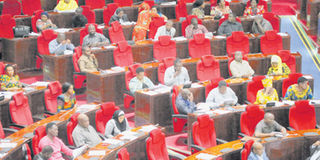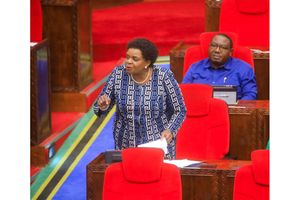The budget dilemma MPs face

MPs during a budget session in the National Assembly.PHOTO|FILE
What you need to know:
- There was much hype, and a lot expectations when Parliament passed the Sh29.5 trillion budget last June.
- Nearly half of it -- Sh11.8 trillion -- was earmarked for development projects. However, by February this year, the government had only released Sh3.97 trillion.
Dar es Salaam. As the curtains close on yet another financial year, the harsh reality of unmet goals checks in amid revelations that only 34 per cent of funds were released in the fifth phase government’s 2016/17 development budget.
There was much hype, and a lot expectations when Parliament passed the Sh29.5 trillion budget last June.
Nearly half of it -- Sh11.8 trillion -- was earmarked for development projects. However, by February this year, the government had only released Sh3.97 trillion.
One of the major reasons for the slow pace, according to the government, is that development partners are not releasing funds as earlier expected.
While the government is still smarting from this major financial setback, it announced a Sh31.6 trillion budget framework for the 2017/18 financial year.
Even so, among the public and analysts, the lingering question is whether or not the new estimates are realistic in the prevailing environment.
There is the question of the role that Parliament will play to ensure that the budget that they pass is executed according to plan.
Tanzania has continuously been ranked low in the Open Budget Survey -- an initiative of the International Budget Partnership.
In 2015, Tanzania scored 46 per cent, while in 2006, 2008 and 2010 it scored 48, 35 and 45 per cent, respectively.
The OBS is a comprehensive analysis and survey that evaluates whether central governments give the public access to budget information and opportunities to participate in the budget process across 85 countries.
It also examines the ability of legislatures to hold their governments accountable. As per the 2010 Open Budget Index, the Tanzanian parliament’s budgetary oversight was rated weak because among the reasons cited, the National Assembly does not have full powers to change the governmnet’s budget proposals.
Another reason for the opoor ranking is that the Parliament does not have sufficient time to discuss and approve the executive’s budget proposal, citing receipt of the budget in less than six weeks before the start of the financial year; and Parliament does not hold open discussions during which the public can participate.
“In the spirit of good governance, there is a need for government to improve parliamentary oversight of the budget process and have it more involved throughout the budget cycle. Improving parliamentary involvement in the budget process augments the legislature’s oversight by creating an incentive to exercise power vis-a-vis the executive while enhancing its technical capacity,” suggests the report.
In citing examples of other African countries that have made some reforms in their budgetary processes, the report mentioned Nigeria, Ghana, South Africa, Kenya and Uganda, among others that have revived their respective Parliament’s oversight function of the budget process by the establishment of an independent entity within the legislature.
“The parliament is an entity that examines the draft annual budget proposed by the executive and provides analytical support to parliamentarians for alternative budget proposals. The entity in reference is known as a parliamentary budget office,” says the report.
Mr David Silinde, the deputy shadow finance minister and Chadema MP (Momba), mainly blames “party caucuses” for the National Assembly’s failure to oversee the government when it comes to budget implementation.
“According to the Constitution of the United Republic and the parliamentary standing orders, we have the mandate to oversee the implementation of the national budget, but the party caucus hinders us to do so,” he said.
“You cannot imagine that until now, instead of implementing 100 per cent of the budget by the end of this June, the government has just covered 26 per cent.”
The MP is pessimistic that with only three months left to the end of June, the government would have implemented the remaining 74 per cent to fulfill its budgetary obligation.
“It is impossible to fill a gap of 74 per cent in the time that remains. This is the ninth month of the year. The problem is that CCM members, who are the majority in Parliament, can’t take the government to task because they feel that if they do so, they shoot themselves in the foot,” said Mr Silinde.
The opposition lawmaker warned that as long as the government send mixed signals on its commitment to respecting the rule of law, freedom of expression, among other pillars of democracy, development partners will not be under any pressure to support the system.
“Sixty per cent of our budget depends on aid and grants, but until now, only Norway has given 52 per cent of its budgetary support. Other countries have been quiet. The Tanzania Revenue Authority (TRA) contributes only Sh13 trillion to the Sh29.5 trillion budget. That contribution goes to salaries and servicing of the national debt. More than Sh16 trillion comes from loans and aid,” he said.
But Mr Jason Rweikiza, secretary of CCM lawmakers, says the government has done its job well and there is not reason to blame it without a strong basis.
“When you pass the budget it doesn’t mean that there is money there already, and you only approve for its expenditure. No. It comes from diverse sources, such as taxes, donor countries, loans etc. You may or may not get all of it. The government has made great efforts to fill the gap,” says the MP.
Mr Rweikiza adds that CCM MPs are “not too blind to see the reality on the ground”.
“We don’t just blame the government. It’s true that we should be vocal on the matter and ask hard questions, but we should also be considerate of the situation.”
According to him poor budget performance doesn’t mean that the government lied to its citizens.
“We do have tangible evidence of development projects that the fifth government has accomplished, including free education, purchasing of three planes for the national carrier, ATCL,” he argues. The MP also believes the government has done a lot to improve access to water and electricity.
Prof Humphrey Moshi of the University of Dar es Salaam says it can take up to three years for the government to fully fund its development projects.
“The budget is an annual plan, you can meet the target or not, depending on the situation, like the availability of rainfall or donor funds,” he says.



